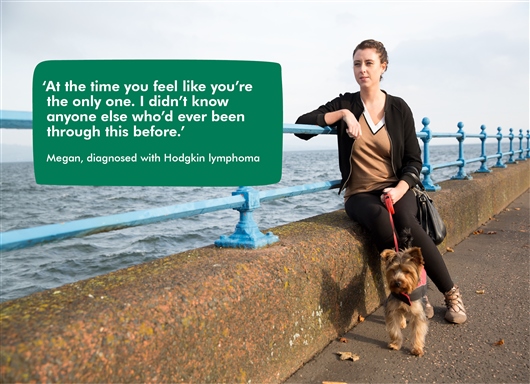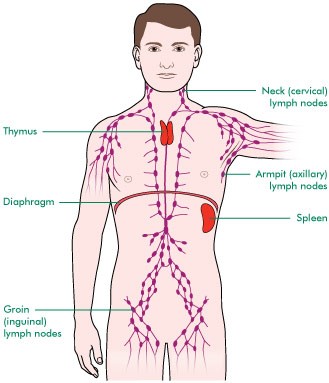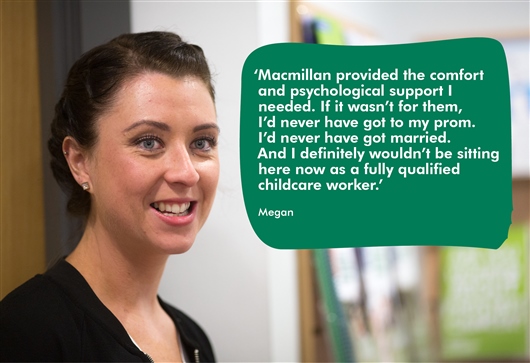At 16, Megan, from Greenock, was doing all the things a regular 16-year old does; attending school, going out at weekends with friends and excitedly getting ready for her prom. That was until she was diagnosed with Hodgkin lymphoma. Today is World Lymphoma Awareness Day and in this blog, written by editor Steven, we’re taking the opportunity to share more about lymphoma and Megan’s story.

What is lymphoma?
Lymphatic cancer, or lymphoma, is cancer of the lymphatic system. This is part of the immune system which helps protect us from infection and disease. The lymphatic system filters fluid called lymph through a network of lymph nodes. There are groups of lymph nodes throughout the body.

In lymphoma, blood cells called lymphocytes become abnormal. These lymphocytes keep dividing and grow out of the body’s control. Over time, they form a lump. The most common place for this to happen is in the lymph nodes.
There are many different types of lymphoma. Different types develop and are treated in different ways.
The two main sub-types are:
NHL is the fifth most common cancer in the UK. Around 13,500 people are diagnosed with it each year.
Around 1,700 people are diagnosed with HL each year. It is more common in people who are 20 to 34-years old, or over 70-years old.
What are the signs and symptoms?
As with Megan, often, the first symptom is a painless swelling in the lymph nodes in one area of the body, such as the neck, armpit or groin.
Other symptoms can include:
These symptoms can be caused by many other conditions not just lymphoma. But it’s still important to have them checked with your GP.
Megan says, ‘The doctor sat us all down and told us the diagnosis. Mum broke down crying, but all I wanted to do was get to my friends and see the fireworks display. It wasn’t until a few weeks later that it sank in’.
What causes lymphoma?
In many cases, experts don’t know exactly what causes lymphoma. However, some things may increase the risk of developing it. These include:
In the below video, Consultant Haematologist Antony Goldstone gives more information about HL and NHL, how they develop, symptoms and treatment:
Further information and support
After her diagnosis, Megan was visited by Julie, a Macmillan nurse. Megan says, ‘I felt scared. I was anxious. I didn’t know what was coming, and I felt as if I was a bit lost as well. Julie came to my house and told us about all the services Macmillan could provide. Julie wasn’t only a nurse – she became my friend as well. She was only ever one phone call away if I was feeling down or when I couldn’t tell my family or my friends how I was feeling’.
If you would like to learn more about the support Macmillan provides, or for more information, you can call our cancer support specialists on 0808 808 00 00.

Or you can read our booklets Understanding Hodgkin lymphoma and Understanding non-Hodgkin lymphoma.
We also have information about lymphoma on our website.
You can visit our Online Community to talk to people affected by lymphoma.
Other organisations that provide information and support to people affected by lymphatic cancer include:
To see what else Macmillan's cancer information team has been blogging about, please visit our blog home page! You can subscribe to receive our blogs by email or RSS too.
We're with you every step of the way
The Macmillan team is here to help. Our cancer support specialists can answer your questions, offer support, or simply listen if you need a chat. Call us free on 0808 808 00 00.
Comments? Feel free to add them below (you need to be logged in).
Keep in touch Follow Macmillan’s cancer information team on Twitter @mac_cancerinfo
Whatever cancer throws your way, we’re right there with you.
We’re here to provide physical, financial and emotional support.
© Macmillan Cancer Support 2026 © Macmillan Cancer Support, registered charity in England and Wales (261017), Scotland (SC039907) and the Isle of Man (604). Also operating in Northern Ireland. A company limited by guarantee, registered in England and Wales company number 2400969. Isle of Man company number 4694F. Registered office: 3rd Floor, Bronze Building, The Forge, 105 Sumner Street, London, SE1 9HZ. VAT no: 668265007